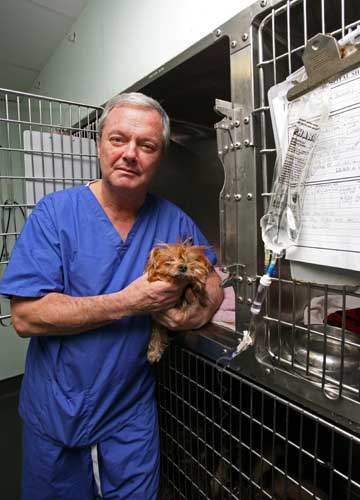First person: 'I deal with extreme cases of dog abuse'
David Grant, 64

Your support helps us to tell the story
From reproductive rights to climate change to Big Tech, The Independent is on the ground when the story is developing. Whether it's investigating the financials of Elon Musk's pro-Trump PAC or producing our latest documentary, 'The A Word', which shines a light on the American women fighting for reproductive rights, we know how important it is to parse out the facts from the messaging.
At such a critical moment in US history, we need reporters on the ground. Your donation allows us to keep sending journalists to speak to both sides of the story.
The Independent is trusted by Americans across the entire political spectrum. And unlike many other quality news outlets, we choose not to lock Americans out of our reporting and analysis with paywalls. We believe quality journalism should be available to everyone, paid for by those who can afford it.
Your support makes all the difference.I've been a qualified vet for 41 years, and the director of north London's Harmsworth RSPCA Animal Hospital for 22 years. And from what I can see, animal abuse is worse now than ever before, certainly in dog-cruelty cases. Back in the Seventies, there tended to be a set pattern with animal abuse, which was mostly down to ignorance. These often involved inadequate feeding and subsequent emaciation and disease. Now, things are far more sinister. With dogs, the majority of cases involve Staffordshire and Pitbull terrier-type dogs. There is a lot of cruelty.
In the most extreme instances, we are seeing dogs who have been beaten, stabbed and shot, and these are none too rare. There has been an inconceivable surge in gratuitous violence against dogs, often as a result of pre-arranged one-on-one fights. Only last weekend I saw 11 such cases. One of my colleagues couldn't handle it any more and is now leaving us. It's a lot for a vet to deal with. Last week, a young vet at this hospital, only two years qualified, had to deal with a puppy who had been bought in after it was found dumped in a local park. The animal had been attacked by a bigger dog, and had half of its face ripped off, before being left for dead. Another was faced with a case where during a domestic incident, a husband beat up his wife and broke their puppy's neck. How do you deal with that?
In my opinion, the root cause of most of these cases seems to be the worrying trend towards owning these dogs as accessories, and as weapons. Because of the demand for certain types of dogs for such purposes – primarily on inner-city housing estates – there has been a huge increase in dog breeding for undeclared profit. As a result, we are seeing a lot of puppies who are diseased due to poor breeding. The number of dogs being dumped is at an all-time high, and Battersea Dogs' Home can no longer take in Staff-type dogs. The problem is seriously out of control.
I have heard a lot of knee-jerk responses to this epidemic. MPs have spoken of mandatory micro-chipping and dog licencing, but this is near impossible to police. The majority of people involved in these cruelty cases are outside of the law. When, assisted by police, we raid a house where illegal breeding of the [banned] Pitbull terrier is suspected to be taking place, we often find the perpetrators are wanted for other offences.
A more integrated social solution is needed. The two issues go hand-in-hand. The problem of abuse is often entwined with poverty and deprivation – the people committing these crimes have been short-changed. How can someone grow up to behave in such a way? This is supposed to be a civilised country, but clearly it is not. I don't know what the answer is, but it does not involve knee-jerk responses.
firstperson@independent.co.uk
Join our commenting forum
Join thought-provoking conversations, follow other Independent readers and see their replies
Comments